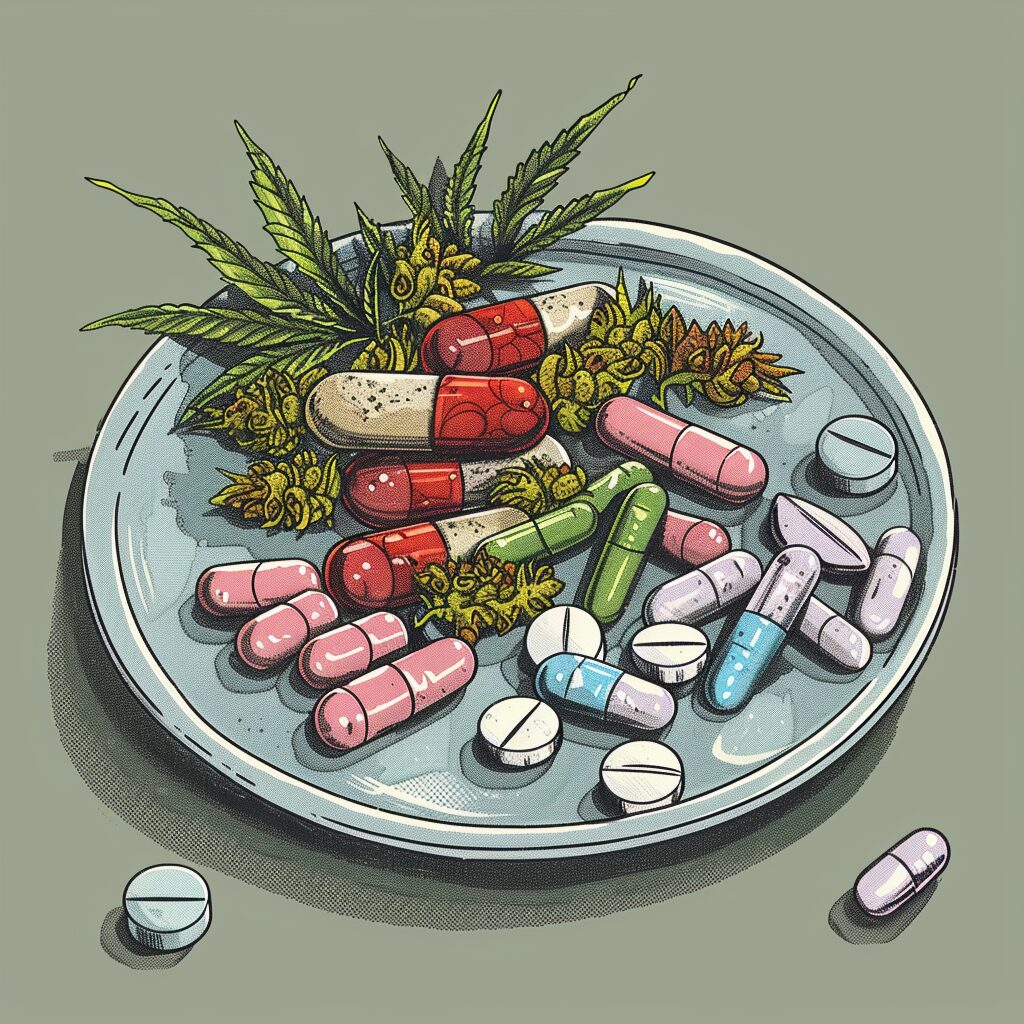Key Takeaways:
- Alcoholism and depression are often linked, with heavy alcohol consumption increasing the risk of developing depression and vice versa.
- Genetics, social factors, and environmental factors can all play a role in both alcoholism and depression, making it important to identify the risk factors of each condition.
- Recognizing the physical, psychological, and behavioral symptoms of both alcoholism and depression is crucial for early intervention and effective treatment, which may include medication, therapy, and support groups.
Do you feel low on energy, have difficulty concentrating, and struggle with sleeping? If so, you may have an increased risk for both alcoholism and depression. This article will explore the relationship between the two conditions and potential treatments.
Alcoholism and Depression: Understanding the Connection
As someone who has struggled with alcoholism and depression, I know firsthand how intertwined these two conditions can be. That’s why it’s important to take the time to truly understand the connection between them. In this part, we ll dive into the link between alcoholism and depression – breaking it down into two sub-sections.
- Alcoholism: Firstly, we ll be defining alcoholism, discussing its symptoms and effects, and providing insight into how it can lead to depression.
- Depression: In the second sub-section, we ll be exploring the complexities of depression, including its causes and symptoms, and how it can perpetuate a cycle of alcohol abuse. Understanding these nuances is crucial for anyone dealing with either of these conditions, so let’s get to it.

Defining Alcoholism: Symptoms and Effects
Alcoholism is a chronic disease that has the power to affect a person’s physical and mental health. Often mistaken as a choice or a moral failing, alcoholism is defined by the manifestation of symptoms and effects that are detrimental to one’s well-being.
Defining alcoholism involves understanding its symptoms and effects that dictate its existence as a disease. These symptoms include cravings for alcohol, inability to control drinking habits, social withdrawal, loss of interest in activities, fatigue, anxiety, insomnia, and others. The effects of alcoholism may lead to liver diseases, digestive problems, cardiovascular disorders, immune system suppression among other severe illnesses.
Medical practitioners are clear about the reasons behind the workings of alcoholism; it alters brain chemistry leading to significant behavioral changes such as impulsiveness and impulsivity towards drinking even when faced with adverse consequences. One thing people should note is that not all who consume alcoholic drinks suffer from the disease.
Researching rare information on defining alcoholism reveals how long-term drinking creates metabolic changes in the brain s reaction to stress hormones which heightens depression and sleep swings. This elevation likely leads to self-regulating stress levels leading some individuals into consistent over-drinking habits due to altered stress responses.
A true history dating back centuries tells us how taverns were closed during times of war out of national security interests because soldiers and sailors weren’t able to perform their duties without drink. The connection between alcoholism and liver disease is well-known. The need for alcohol eventually became so pervasive after these wars ends that nearly every home contained an alcoholic drink within arm’s reach.
With these kinds of historical facts influencing contemporary views on depression diagnosis while imbibing can have far-reaching implications on society s emotional wellbeing in this era hence understanding depression: causes and symptoms goes hand in hand with Defining Alcoholism: Symptoms And Effects.
Understanding Depression: Causes and Symptoms
Depression: Causes, Symptoms, and Treatments
Depression is a multifaceted condition with varying causes and symptoms, making it complex to understand. It’s essential to have a deep understanding of these aspects of depression to diagnose and treat it effectively. Seemingly, understanding depression’s causes and symptoms could be the key to designing effective interventions for treating depression.
Depression often occurs due to the imbalance of chemicals in the brain that affects mood regulation, sleep, appetite, energy level, and concentration. This disrupts psychological functioning results in feelings of hopelessness, sadness, or despair. Apart from this strictly biological aspect, environmental factors- like socio-economic status or life events- can also play into why someone may experience significant depressive episodes.
Depressive episodes manifest in many ways – the major criteria being low mood throughout most of the day once every day for at least two weeks. Other symptoms include disinterest in hobbies or things that were once enjoyable, low energy levels, or lack of motivation. Beyond emotional experiences, people experiencing depression often also feel physical changes such as sleep disturbances, weight gain/loss, or digestive issues.
Depression’s complexities highlight how important it is to get accurate information about its symptoms and causes. This information will allow individuals who suspect they might be experiencing depression to identify as such so they can reach out and take steps towards seeking treatment options that work for them.
Don’t stay helpless if you’re dealing with feelings like these depression is overwhelming but please trust that help is available
Identifying Risk Factors for Depression & Alcoholism
Thinking about one heading alone can become overly burdensome when we unpack all there is regarding identifying different risk factors for depression & alcoholism – however, clearly laying them out there one-by-one will bring us a step closer towards understanding this intersection better.
Identifying the Risk Factors for Alcoholism and Depression
In this part of the article, we will take a closer look at the risk factors that may contribute to the development of both alcoholism and depression. As someone who has struggled with both issues, I can attest to the importance of identifying these factors in order to better understand and manage these conditions. We will explore genetic risk factors and how DNA plays a role, as well as the impact of social factors such as family and peers. Additionally, we will take a look at environmental factors, such as the influence of lifestyle choices and circumstances, that can contribute to the onset of both alcoholism and depression.

Genetics: How DNA Plays a Role
Genetics: How DNA Plays a Role
Have you ever wondered why certain traits run in families? Why do some children have the same eye color as their parents, or why are some people more prone to developing certain diseases?
The answer lies in genetics – the study of how traits are passed down from one generation to the next through DNA. Our DNA contains instructions for building and maintaining every cell in our body, and variations in these instructions can result in unique physical and behavioral characteristics.
But how does genetics play a role in the development of alcoholism and depression? Well, it turns out that both of these disorders have been shown to have a genetic component.
Research has identified several genes that may contribute to an increased risk for alcoholism and/or depression. Some of these genes affect how our brains respond to stress or reward, making individuals more susceptible to developing these disorders.
Furthermore, research suggests that environmental factors can interact with genetic predispositions to increase the risk even further. For example, individuals who have a family history of alcoholism may be more likely to develop the disorder if they also experience high levels of stress or trauma during adolescence.
Knowing this information about genetics can be helpful when trying to identify potential risk factors for alcoholism and depression. If you have a family history of either disorder, it may be beneficial to take preventative measures such as avoiding excessive alcohol consumption and seeking mental health support when needed.
So while genetics isn’t the only factor involved in the development of alcoholism and depression, it is an important piece of the puzzle that shouldn’t be overlooked.
Next up: Social Factors: Impact of Family and Peers – but first, let’s explore how our social connections can influence our mental health.
Social Factors: Impact of Family and Peers
Social factors play a critical role in shaping a person’s behavior, thoughts, and emotions. Among the various social factors, the impact of family and peers on an individual’s psychological well-being cannot be overstated.
Family is the first social group that a child interacts with and learns from. The family provides a foundation for developing behavioral patterns, values, beliefs, and expectations. The quality of relationships between family members shapes the child’s perception of self-worth and emotional stability. Positive family relationships can lead to positive developmental outcomes such as emotional regulation skills, while negative family relationships can result in mental health problems like depression or alcoholism.
Moreover, peers play an important role during adolescence when individuals seek approval and validation from their peer groups. Peer pressure, whether positive or negative, influences decision-making processes that affect risk-taking behaviors such as alcohol consumption or drug abuse. Negative peer relations link with depressive symptoms as adolescents may face bullying or social isolation resulting in feelings of anxiety and hopelessness.
Further clarifying how social factors contribute to depression or alcoholism; it should be noted that dysfunctional families increase the risks for both conditions significantly. Neglectful parent-child attachment styles cause children to have issues with trust development which manifest into depressive symptoms later on in life. Similarly, abusive home environments often result in children seeking solace through drugs or alcohol addiction.
Giselle was raised by drug dealer parents who suffered from substance abuse disorders themselves. She bore witness to constant violence and witnessed physical abuse inflicted upon her mother by her father regularly leading her towards using drugs at a young age herself.
“Living my childhood amidst chaos erupted by my parents’ drug addictions made it unbearable for me not to use them too eventually,” Giselle says.
Understanding how impact factor manifests itself is essential because it contributes greatly towards treating patients grasping alcoholism along with other underlying social anxieties they may be struggling with.
“I couldn’t bring myself to even step outside my home out of fear of social criticism,” Giselle shares.
Stepping outside of one’s safe zone requires substantial effort in the face of Social Factors that work to maintain stigmatized histories.
Environmental Factors: Influence of Lifestyle and Circumstances
Environmental factors can play a significant role in influencing an individual’s lifestyle and circumstances. These factors can create both positive and negative impacts on an individual’s mental health, which is why it is crucial to identify the risk factors that may lead to alcoholism and depression.
In terms of environmental factors, there are several important points to consider. Firstly, our surroundings significantly impact our overall wellbeing. For example, living in polluted or noisy areas can be detrimental to our mental health. Similarly, experiences of trauma, social isolation or lack of support from family and friends can trigger episodes of anxiety or depression.
Additionally, lifestyle choices such as unhealthy eating habits, lack of exercise or sleep, and substance abuse contribute significantly to an insecure mental state. Drinking large amounts of alcohol often leads to imbalanced moods and feelings of depression.
Environmental factors such as poverty or financial stress could also play a significant role in developing alcoholism and depression. Living in impoverished conditions often creates feelings of hopelessness and despair that lead people towards the addiction cycle.
It is important to take charge of your surroundings by making mindful choices that promote wellness. This includes building healthy relationships with family and friends who support you emotionally when feeling down; prioritizing self-care routines like getting enough sleep at night; practicing stress-relieving activities like yoga or meditation; managing financial stress by taking steps towards saving money over time.
Before identifying the symptoms associated with alcoholism and depression, it’s essential first understand what environmental factors may trigger these ailments. It’s all about making conscious decisions throughout life while maintaining balance both mentally physically.
Recognizing the Symptoms of Alcoholism and Depression
Have you or someone you know been experiencing persistent negative feelings while battling with alcoholism? It might be an indication of alcohol-induced depression. In this segment, we explore some of the symptoms and warning signs of alcoholism and depression. We ll examine both the physical and psychological symptoms, as well as behavioral symptoms that may be present. Recognizing these symptoms and seeking help sooner rather than later can make all the difference in effectively addressing and overcoming these challenging issues.

Physical Symptoms of Alcoholism and Depression
Physical Symptoms of Alcoholism and Depression can manifest in a variety of ways that can be easily overlooked. In many cases, people suffering from alcoholism also experience depression or vice versa, making it important to recognize the signs early on.
Some common physical symptoms of alcoholism and depression include:
- Chronic fatigue
- Changes in sleeping patterns
- Weight fluctuations
- Digestive issues
Alcoholism can also damage the liver leading to jaundice, abdominal swelling, and painful liver inflammation. Additionally, individuals struggling with depression may experience body aches, headaches, and sexual dysfunction.
These physical symptoms are not isolated but are often interconnected with more severe long-term consequences. The health risks increase for those who engage in chronic heavy drinking and don t seek help for their condition promptly.
One true story is that of Amy Winehouse; a famous British singer who struggled with both alcohol addiction and depression before her untimely death at age 27 due to alcohol poisoning. Her story highlights the importance of recognizing the physical symptoms of alcoholism and depression before it’s too late.
With these physical symptoms noted above taken into consideration, we must also point out that recognizing only physical symptoms may not be enough when dealing with mental health illnesses like depression. But don’t worry! Next up is “Psychological Symptoms of Alcoholism and Depression,” where I’ll give you all the information you need on how to get started on identifying the emotional impacts too!
Psychological Symptoms of Alcoholism and Depression
Psychological Symptoms of Alcoholism and Depression can be a complex issue that affects millions of people worldwide. The mind, body, and spirit are all affected by alcoholism and depression, resulting in various psychological symptoms.
Firstly, these two conditions have a direct link between them. If someone suffers from alcoholism, it often leads to or worsens depression. This connection has been noted through various studies on the effects of alcohol on the brain and its chemical reactions.
Psychological symptoms of alcoholism and depression include anxiety, irritability, mood swings, low self-esteem, feeling hopeless or helpless, lethargy, trouble concentrating or remembering things. These symptoms can appear in varying degrees for different individuals.
Furthermore, it is essential to note that psychological symptoms are not always obvious or easily recognizable. People often suffer silently due to shame or stigma attached to mental health issues.
A real-life example is helpful here: John was an alcoholic for over ten years before seeking out help. His wife noticed changes in his behavior such as severe sadness and angry outbursts leading him towards deep depression. It wasn’t until she urged him to see a doctor that he realized his worsening condition was due to a drinking problem coupled with depression.
Behavioral Symptoms of Alcoholism and Depression
Behavioral Symptoms of Alcoholism and Depression can have devastating effects on a person’s life. These symptoms can manifest in a variety of ways, often overlapping with each other. Some of the most common behavioral symptoms include changes in mood, sleep patterns, appetite, and social behavior.
One of the primary behavioral symptoms of alcoholism and depression is changes in mood. People suffering from these conditions may experience frequent changes in their emotions or may become emotionally numb. They may feel helpless, hopeless, or empty and struggle to find pleasure in activities they once enjoyed. Often individuals with these conditions may also feel irritable, agitated or angry.
Another common symptom is changes in sleep patterns. Individuals with alcoholism and/or depression may experience insomnia or oversleeping which only further exacerbates their problems. Changes in appetite are also frequently present whereby sufferers overeat/take drugs or lose interest in food entirely.
The last symptom is changes in social behavior shown off by those with alcoholism and/or depression where an individual will withdraw from usual social settings but maybe start joining particular environments/venues as a form of release.
People who suffer from both depression and alcoholism are at an even greater risk for more severe symptoms such as suicidal thoughts/actions which cannot be taken lightly.
It has been revealed that up to 40% of people who struggle with alcoholism also suffer from depression (source: National Institute on Alcohol Abuse and Alcoholism). This statistic indicates how closely linked these two conditions can be for people struggling with addiction.
Feeling defeated by your diagnosis? Don’t worry; you’re not alone! In the next section ‘Treatment Options for Alcoholism and Depression: A Comprehensive Guide,’ I’ll share my firsthand experiences along with detailed information on how to seek out help to lead a better life- it’s all about taking the first step!”
Treatment Options for Alcoholism and Depression: A Comprehensive Guide
As someone who has struggled with both alcoholism and depression, I know firsthand how overwhelming it can feel to try and find a treatment option that works. In this guide, we’ll explore the different options available for treating alcoholism and depression together.
First, we’ll take a look at the different types of medication that are commonly used, and how effective they are in treating dual diagnosis. Then, we’ll delve into therapy, examining new approaches that are gaining traction in the field. Lastly, we’ll look at the vital role that peer support groups play in the journey to recovery.
By the end of this guide, you’ll have a comprehensive understanding of the different treatment options out there and be better equipped to make informed decisions about your own care.

Medication: Types and Effectiveness
Medication is often a crucial part of the treatment plan for alcoholism and depression. Medications come in different forms, such as antidepressants and anti-anxiety drugs, which can help alleviate the symptoms of these conditions. The effectiveness of medication varies from person to person, but it can be an essential tool in managing both alcoholism and depression.
Medications work by targeting chemical imbalances in the brain that contribute to symptoms of depression and anxiety. They can also help reduce cravings for alcohol by blocking the pleasure centers in the brain that are activated by drinking. Medications are often combined with therapy to provide a comprehensive approach to treating these conditions.
While medications have been proven effective for many people, they do come with potential side effects. It is important to work closely with a qualified healthcare professional to carefully monitor any adverse reactions and adjust dosages as needed. Some medications may need time to take effect, while others may require frequent adjustments or a switch to another medication altogether.
It is also important to note that medication is not always the best option for everyone. Some people may not respond well to certain medications or may prefer a more holistic approach to treatment. There are many different alternatives available, including herbal remedies, lifestyle changes, and alternative therapies.
There is no one-size-fits-all approach when it comes to treating alcoholism or depression with medication, but it can be an effective tool when used appropriately.
As I was struggling with both alcoholism and depression myself, I found solace in taking anti-depressants specifically formulated for those who were also fighting alcohol dependency like me. Combined with therapy sessions where I could discuss my feelings openly, my medication helped me feel more level-headed throughout my day-to-day life.
“Therapy: Exploring Different Approaches” – Let’s dive into discovering what techniques have proven helpful beyond conventional talk-therapy especially when dealing with co-occurring disorders like ours!
Therapy: Exploring Different Approaches
Therapy: Exploring Different Approaches is a crucial aspect of treating alcoholism and depression. Therapies are not one-size-fits-all solutions; therefore, exploring different approaches becomes necessary to find the best-suited therapy.
Therapy works by providing individuals with tools and coping mechanisms that help them manage their emotions and behaviors. It helps individuals identify underlying issues behind their addictions and mental health struggles. Moreover, therapy provides individuals with a safe space to share their experiences, fears, or concerns without any fear of judgment.
However, many people resist seeking therapy because they worry about the stigma attached to it or are hesitant about opening up. But what they don’t realize is that therapists use different approaches based on an individual’s needs, personality, and preferences. These may include cognitive-behavioral therapy (CBT), dialectical behavior therapy (DBT), psychodynamic therapy, etc.
It’s worth noting that different therapies work differently for different individuals. Therefore it’s essential to find a therapist who specializes in treating alcoholism and depression and uses the right approach based on your condition. In some cases, combining therapies such as medication with psychotherapy can lead to better outcomes.
I once met a woman who had been struggling with severe depression for years but resisted seeking therapy due to societal stigma around mental health illnesses. When she finally decided to seek help and attended CBT sessions with a recommended therapist, she felt understood for the first time in her life – this experience completely changed her perspective on getting professional help.
Support groups play an integral role in overcoming addiction and improving mental health wellness – joining such groups reduces isolation while providing emotional support from peers who are dealing with similar challenges. So if you’re still hesitating about seeking professional help, take the first step today by asking for resources available regarding support groups near you – remember that change starts within you!
Support Groups: The Importance of Peer Support
Support Groups: The Importance of Peer Support can be a game-changer in the treatment of alcoholism and depression. Often, people who suffer from these conditions feel isolated, alone, and misunderstood. They may find it hard to share their struggles with their loved ones or friends due to fear of being judged or stigmatized. This is where Support Groups come into play.
Support groups are made up of people who share similar experiences and struggles. Members come together to provide emotional support, practical advice, and encouragement to each other. These groups work on the principle of peer support – where members assist each other by sharing their personal insights, stories, challenges, and successes.
Peer support is effective because it brings together people who can relate to each other’s experiences and provide non-judgmental empathy. It creates a sense of belonging that enables individuals to connect with others who understand their hardships without feeling labeled or ashamed. Additionally, peer support provides an opportunity for accountability as members check-in on each other’s well-being.
One crucial role played by Support groups is promoting mental health hygiene among its members. For example, some such groups organize activities like exercise classes or meditation sessions that help manage depression symptoms more effectively. Members are also encouraged to seek professional help if needed through these discussions.
If you’re looking to join a Support Group but have reasons for hesitance in doing so due to concerns over privacy or worries about anonymity issues- it’s imperative that you find one that adopts strict confidentiality protocols, which will enable you anonymity! Volunteer therapy advocates heard nationwide via text outreach more confidential than helpline services they match our top-rated therapists according to your preferences for free!
Preventing the Connection Between Alcoholism and Depression
It’s a well-known fact that alcoholism and depression are closely related to each other. However, the good news is that there are ways to prevent this dangerous connection from taking root, and that’s what we’re going to focus on in this part of the article. We’ll be exploring three sub-sections that provide helpful tips on how to keep depression at bay while dealing with alcoholism, so that you can lead a happier and healthier life. The sub-sections are:
- Healthy coping strategies to deal with stress and anxiety
- Effective stress management techniques
- Building a strong social support network for better mental health
Let’s dive in and find out more!

Healthy Coping Strategies: Tips for Dealing with Stress and Anxiety
Stress and anxiety are a common occurrence in life, and it can be quite challenging to deal with them. Healthy coping strategies are ways that one can manage stress and anxiety in a constructive way. There are several things you can do to relieve yourself of the pressure and keep up with the demands of daily life.
One way to cope with stress is through exercise. Research shows that physical activity can help improve mood and release endorphins, which naturally make you feel good. Additionally, people who exercise regularly generally report lower levels of both anxiety and depression than those who don’t.
Another beneficial way to relieve stress is by practicing mindfulness or meditation. Mindfulness is about focusing on the present moment without judgment, while meditation helps quiet your mind and body for relaxation. These practices have been shown to reduce symptoms of depression and anxiety, increase feelings of self-awareness and self-acceptance.
It’s essential to note that some coping mechanisms may work better for one person than another. Talking with a trusted friend or family member about your stresses may be helpful for some individuals while others may choose to speak with a therapist or counselor who has training in how to handle such situations.
There’s no one-size-fits-all approach when it comes to dealing with stress anxiety; however, adopting healthy coping strategies is an effective way to tackle these issues head-on.
In 2020, studies found that over 60% of Americans experienced mental health concerns due to stress from the pandemic. It highlights how individuals need to understand what works best for their unique needs during stressful periods.
If you’re looking for other effective ways besides the ones mentioned above, stay tuned for our next topic – Stress Management: Effective Techniques for Reducing Stress – where I’ll share more firsthand experience on dealing with pressures and obstacles in daily life without being overwhelmed!
Stress Management: Effective Techniques for Reducing Stress
Stress is an inevitable part of our lives, and its impact can be seen in our physical and mental well-being. The more stress we take, the greater the chance of developing illnesses such as high blood pressure, heart disease, anxiety, and depression. Stress management: Effective techniques for reducing stress is something that we all need to learn in this fast-paced world.
Firstly, identifying the source of stress is paramount. When we know what causes us stress, be it work pressure or relationship problems or financial issues or all of them combined, we can find constructive ways to deal with them. Secondly, taking a break from stressful situations and pampering oneself with activities such as yoga, meditation or any physical exercise help release feel-good hormones – endorphins – which helps reduce stress levels. Thirdly, finding healthy ways to cope with stressors such as talking to a friend or family member about what’s causing your tension can enable you to see things from another perspective while discussing future steps.
Lastly, cultivating a positive mindset reduces our vulnerability to negative emotions that cause stress. When we focus on the things that bring us joy and make us happy rather than dwelling on situations that cause unhappiness and distress tends to induce serenity.
Stress management: Effective techniques for reducing stress also involves avoiding self-destruction habits like overeating junk food watching too much Television or spending too much money when under duress. Research suggests getting good sleep at night lowers cortisol levels – the body s primary stress hormone” . Practising good sleep hygiene has proven therapeutic effects on increasing brain functioning.
Take a true history example where Emma was running short of time before her big presentation causing her tremendous anxiety; breathing exercises suggested by a friend enabled calming herself within seconds allowed her to pull through the rigorous meeting comfortably without any panic attacks.
Social Support Networks: Building Relationships for Better Mental Health
Social Support Networks are a crucial factor in helping individuals maintain good mental health. These networks build and promote relationships that offer emotional, psychological, and practical assistance during times of crisis or everyday challenges. The key foundation for this is to build healthy relationships among family, friends, colleagues or peers.
Creating social support networks works on the premise that expressing emotions and receiving supportive feedback helps individuals better understand their own emotions and reactions to life situations. This will significantly improve coping mechanisms, prevent mental disorders such as anxiety and depression or aid in their recovery from it. Social support networks can help an individual by providing the necessary resources to overcome stressors like financial problems or domestic conflicts that lead to depression.
Social Support Networks play a vital role in reducing substance abuse risk factors; moreover, connections formed through those networks become protective factors against addiction risk factors. Researchers have found that having robust social support can buffer the impacts of stress-induced alcohol consumption. Social Support Networks function when someone feels supported by their friends/relatives anonymously with trustworthiness essential for them to seek assistance without fearing prejudice or judgment.
At times, developing a Social Support Network may be challenging due to societal expectations, personal limitations or insecurities about sharing experiences with others. However, seeking professional help such as therapy services can guide an individual in building these connective tissue ties that build mutual trust with peers leading him/her towards healthier social relationships.
A 35-year-old bartender named Mark struggled for a few years battling Alcoholism during his late 20s which ultimately worsened along with his depressive thoughts emanating from various interpersonal issues during his daily life routine until he signed up for cognitive therapy sessions at age 32. He learned how to express feelings appropriately leading him towards developed self-confidence which he now exudes within all aspects of his daily occupations more positively as well increasing his patients’ worth towards customers walking into the bar offering solace when they most need it-a feeling he got from similar supportive relationships built during his therapeutic journey. Mark’s experiences demonstrate how social support networks can alleviate a person’s struggles and lead to recovery.
Five Facts About The Connection Between Alcoholism and Depression:
- Depression is more common in individuals with alcohol use disorder. (Source: Psychiatry.org)
- Alcohol is a depressant that can exacerbate symptoms of depression. (Source: HelpGuide)
- The co-occurrence of depression and alcoholism can complicate treatment and increase the risk of relapse. (Source: National Institute on Alcohol Abuse and Alcoholism)
- Some individuals with depression may turn to alcohol as a means of self-medication. (Source: Harvard Health Publishing)
- Integrated treatment that addresses both depression and alcohol use disorder can lead to better outcomes and improved quality of life. (Source: American Addiction Centers)
FAQs about The Connection Between Alcoholism And Depression
What is the connection between alcoholism and depression?
The connection between alcoholism and depression are closely related, as both conditions can have a significant impact on a person’s mental health. Individuals who struggle with addiction may turn to alcohol to self-medicate for their depression, which can make their symptoms worse over time.
How does alcohol affect depression?
Alcohol affects a depressant, which means that it slows down the central nervous system and can contribute to feelings of sadness, hopelessness, and despair. Additionally, regular and excessive alcohol use can exacerbate existing symptoms of depression and lead to a higher risk of suicide attempts.
Can alcohol lead to depression?
Yes, alcohol can be lead a depression contributing factor to the development of depression. The chemical changes that occur in the brain when an individual consumes alcohol can cause changes in mood and behavior, including symptoms of depression. Additionally, alcohol abuse can cause a number of physical, emotional, and social problems that can contribute to the onset of depression over time.
What are the warning signs of alcoholism and depression?
The warning signs of alcoholism may include drinking alone or in secret, engaging in risky behaviors while under the influence, and experiencing withdrawal symptoms when attempting to stop drinking. The warning signs of depression may include feelings of sadness, hopelessness or guilt, changes in appetite or sleep habits, and a loss of interest in hobbies or activities.
How is the connection between alcoholism and depression treated?
The connection between alcoholism and depression is typically treated through a combination of therapy, medication, and support groups to address both the alcohol addiction and the underlying mental health issues. It is important to seek treatment from a qualified mental health professional who can help address the complex interplay between these two conditions.
What can be done to prevent alcoholism and depression?
To prevent alcoholism and depression, including limiting alcohol consumption, seeking treatment for mental health issues, and practicing healthy coping mechanisms such as exercise, meditation, and social support. Additionally, it is important to maintain open and honest communication with loved ones and seek help if warning signs of alcoholism or depression arise.









